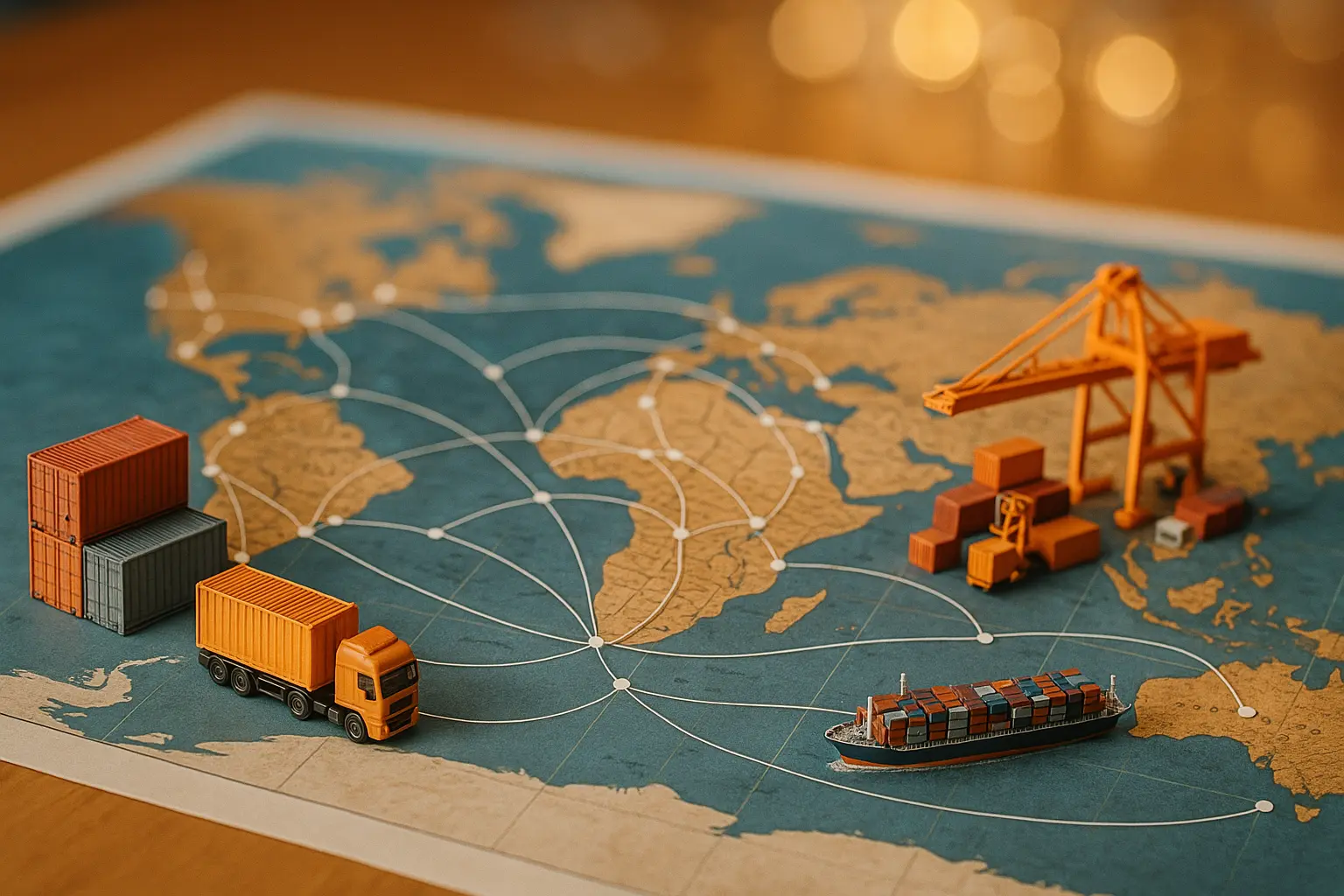Welcome to the new reality, where the intricate dance of global supply chains is more than just a corporate conundrum — it is now a geopolitical chess game. As we surf the waves of a rapidly evolving world, the fragile balance of production and trade, once perceived as an endlessly flowing stream, is increasingly beset by turbulence influenced by international relations. In this article, we delve into the profound impact of geopolitical dynamics on global supply chains, an issue that affects every corner of the economic landscape. From the corridors of multinational corporations to the bustling streets of local markets, the reverberations of geopolitical shifts are felt far and wide.
Understanding the Geopolitical Landscape
geopolitics and global supply chains have become interlinked, and understanding this connection is critical to navigating today’s business environment. Geopolitical events, often dictated by international relations, trade policies, and strategic alliances, create a ripple effect that cascades down to the very fabric of global trade.
Geopolitical Tensions and Trade Policies Trade agreements once stood as pillars supporting global business operations, but today’s geopolitical landscape is more unpredictable. With major players like China and the United States engaging in strategic maneuvers, trade policies become tools in a much larger game.
The Role of Strategic Alliances Countries often form strategic partnerships to bolster their economic stature, yet these alliances can shift, causing seismic tremors in the supply chain. When nations like those in the European Union or the Asia-Pacific Economic Cooperation make collective decisions, businesses must recalibrate to stay in sync.
Navigating Economic Sanctions Economic sanctions, wielded as a diplomatic instrument, can directly impact supply chain operations. Companies worldwide must remain vigilant, as sanctions can transform trusted suppliers into liabilities overnight.
In an era defined by geopolitical uncertainty, companies must remain agile, anticipate changes, and develop comprehensive strategies to mitigate risks associated with international trade.
The Ripple Effect on Global Supply Chains
As geopolitical forces reshape the global trade landscape, the implications for supply chains are both profound and multifaceted. From sourcing raw materials to delivering finished products, businesses face an array of challenges that demand innovative solutions.
Supply Chain Disruptions Geopolitical tensions often manifest as tangible disruptions. Whether through port closures, transportation blockades, or regulatory hurdles, these issues create bottlenecks that ripple across industries. A key example is the recent disruptions in semiconductor production, where geopolitical dynamics played a pivotal role.
Shifts in Supplier Dynamics With the global trade environment in constant flux, companies must re-evaluate their supplier relationships. Diversification becomes essential as businesses seek to mitigate risks by establishing redundancies and fostering partnerships across varied geopolitical regions.
Risk Management and Contingency Planning In the face of potential risks, effective supply chain management hinges on proactive strategies. Companies that adopt agile frameworks, employ digital technologies for real-time tracking, and develop industry partnerships will be better positioned to weather geopolitical storms.
The complexities of modern supply chains require an all-encompassing approach to risk management, ensuring businesses remain resilient amid geopolitical upheavals.

Strategic Responses to Geopolitical Risks
To thrive in today’s volatile climate, businesses must develop strategic responses that address the challenges posed by geopolitical risks. Through a combination of foresight and adaptability, companies can navigate the complexities of global supply chains.
Adopting a Proactive Approach The key to managing geopolitical risks lies in shifting from reactive to proactive strategies. Organizations that prioritize scenario planning and predictive analytics will possess the foresight needed to adapt to potential challenges.
Investing in Technology Digital transformation is more than a buzzword — it’s a survival mechanism. Implementing supply chain management software and blockchain technology enables real-time visibility, fostering transparency and collaboration across global networks.
Strengthening Local and Regional Networks In an unpredictable world, cultivating local and regional supplier networks offers a buffer against global disruptions. By building robust relationships within specific markets, businesses can reduce dependency on single points of failure.
Fostering Government and Industry Collaborations Partnerships between the private sector and government entities are crucial in navigating the interplay between geopolitics and trade. By aligning national interests with business strategies, companies can bolster their resilience in the face of geopolitical challenges.
In this era of rapid change, strategic foresight and adaptive responses are the cornerstones of successful supply chain management, enabling organizations to thrive amid global uncertainties.
Geopolitics as a Catalyst for Innovation
While geopolitical challenges present formidable obstacles, they also serve as a catalyst for innovation and progress within global supply chains. Businesses that embrace change and adapt to new realities can capitalize on opportunities arising from geopolitical shifts.
Seizing Opportunities in Emerging Markets As traditional markets face unpredictability, emerging economies offer businesses a chance for growth. With strategic investments and partnerships, companies can tap into new customer bases and production capabilities.
Sustainable Supply Chain Practices The demand for sustainable and ethical supply chains has gained momentum. Geopolitical pressures often highlight the importance of environmentally conscious practices, prompting businesses to adopt greener strategies and enhance corporate responsibility.
Innovative Logistics and Distribution Solutions As companies adapt to geopolitical changes, they explore innovative logistics solutions. From autonomous vehicles to drone deliveries, cutting-edge technologies are integrated to ensure efficient and resilient distribution networks.
Leveraging Data Analytics for Strategic Insights Data-driven decision-making empowers companies to optimize their operations. By harnessing the power of big data and AI, businesses can gain actionable insights, anticipate geopolitical trends, and make informed choices.
Amid the challenges posed by geopolitics, innovation flourishes. Businesses that embrace change, leverage technology, and capitalize on new opportunities will emerge stronger and more resilient in the global supply chain arena.
In the ever-evolving landscape of global trade, the impact of geopolitics on supply chains is undeniable. As businesses navigate this complex maze, they must embrace a mindset of adaptability, innovation, and resilience. By strategically responding to geopolitical risks and seizing opportunities for growth, companies can thrive in an interconnected world, ensuring their place in the future of global commerce. The ability to adapt and innovate will define success in this new era, where geopolitics is not just an influence but a driving force in shaping the future of supply chains.
FAQ
How does geopolitics influence global supply chains?
Geopolitics can significantly impact global supply chains by altering trade routes, introducing tariffs, and influencing diplomatic relations. Political tensions between countries can lead to sudden changes in import/export regulations, creating bottlenecks and increasing costs for businesses.
What role do trade agreements play in international supply chains?
Trade agreements facilitate smoother transactions between countries by reducing tariffs, removing trade barriers, and establishing standardized regulations. They help stabilize supply chains by ensuring predictable trade flows and fostering economic cooperation.
How have recent geopolitical events affected supply chain reliability?
Recent geopolitical events, such as trade wars and regional conflicts, have disrupted supply chains by causing delays, increasing logistical costs, and forcing companies to seek alternative suppliers or routes. These disruptions can lead to shortages and affect global markets.
In what ways can companies mitigate geopolitical risks in their supply chains?
Companies can mitigate geopolitical risks by diversifying their supplier base, investing in robust risk management systems, staying informed about geopolitical developments, and developing contingency plans. Building strong relationships with local suppliers can also reduce vulnerability.
What is the future outlook for global supply chains in a geopolitically volatile environment?
The future of global supply chains in a geopolitically volatile environment may involve more regionalization, with companies opting for local or nearshore suppliers to reduce risk. Advances in technology, such as digital tracking and automation, might also play a crucial role in enhancing supply chain resilience.



